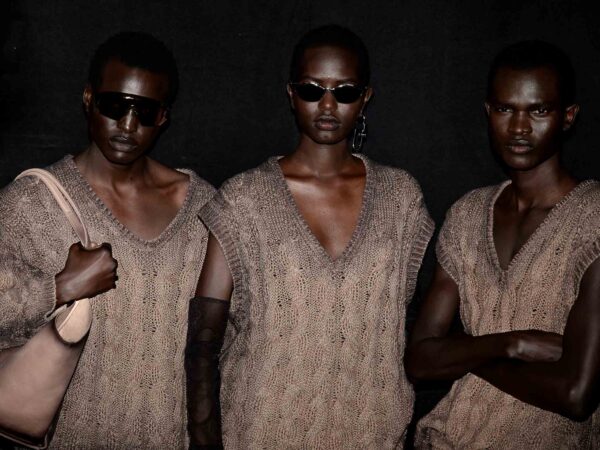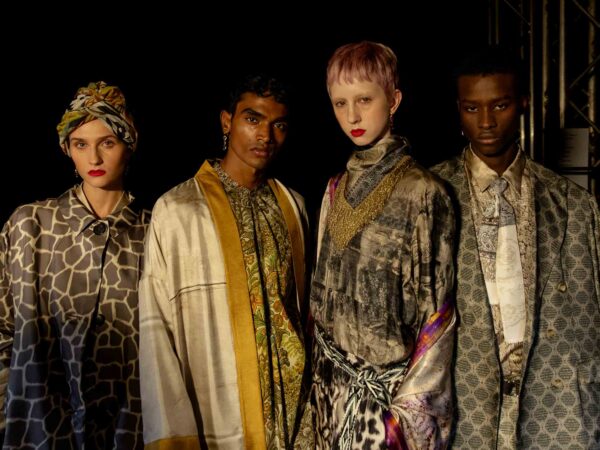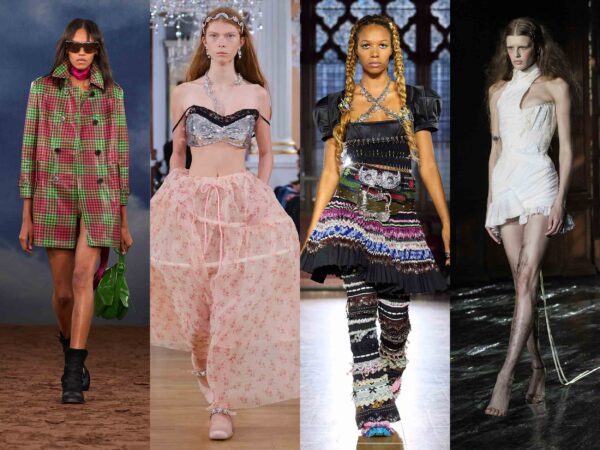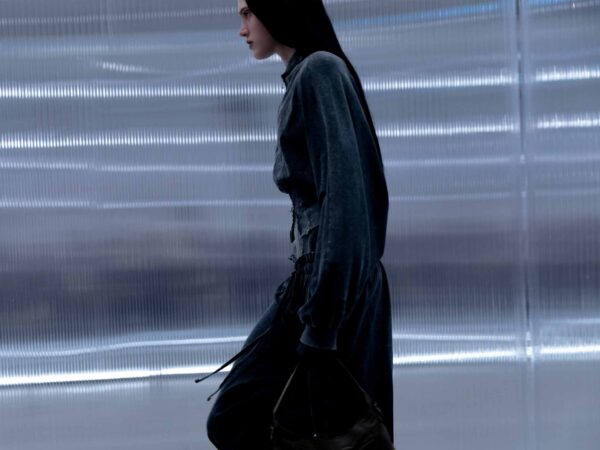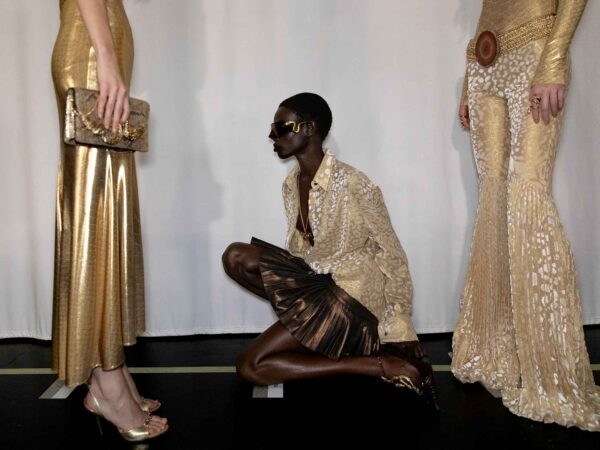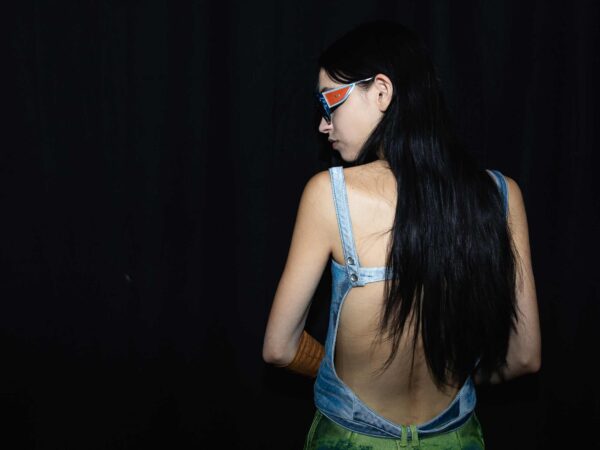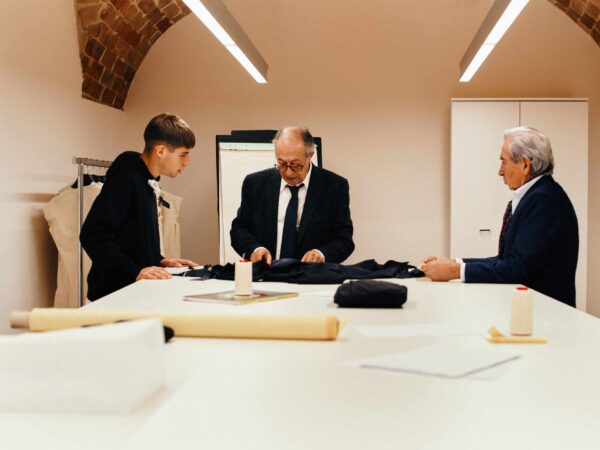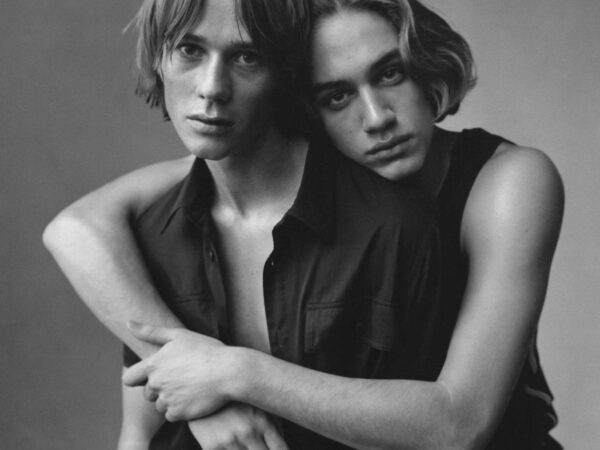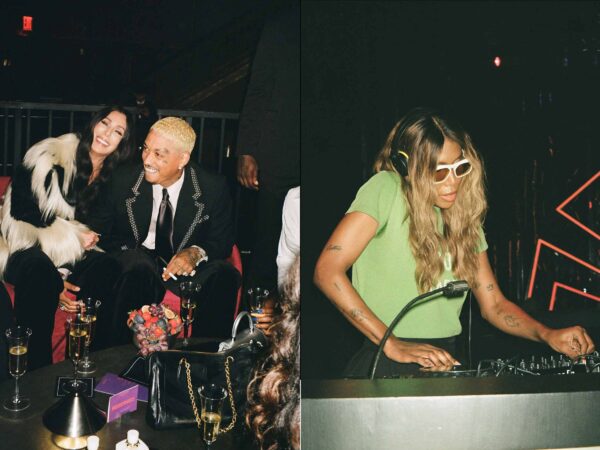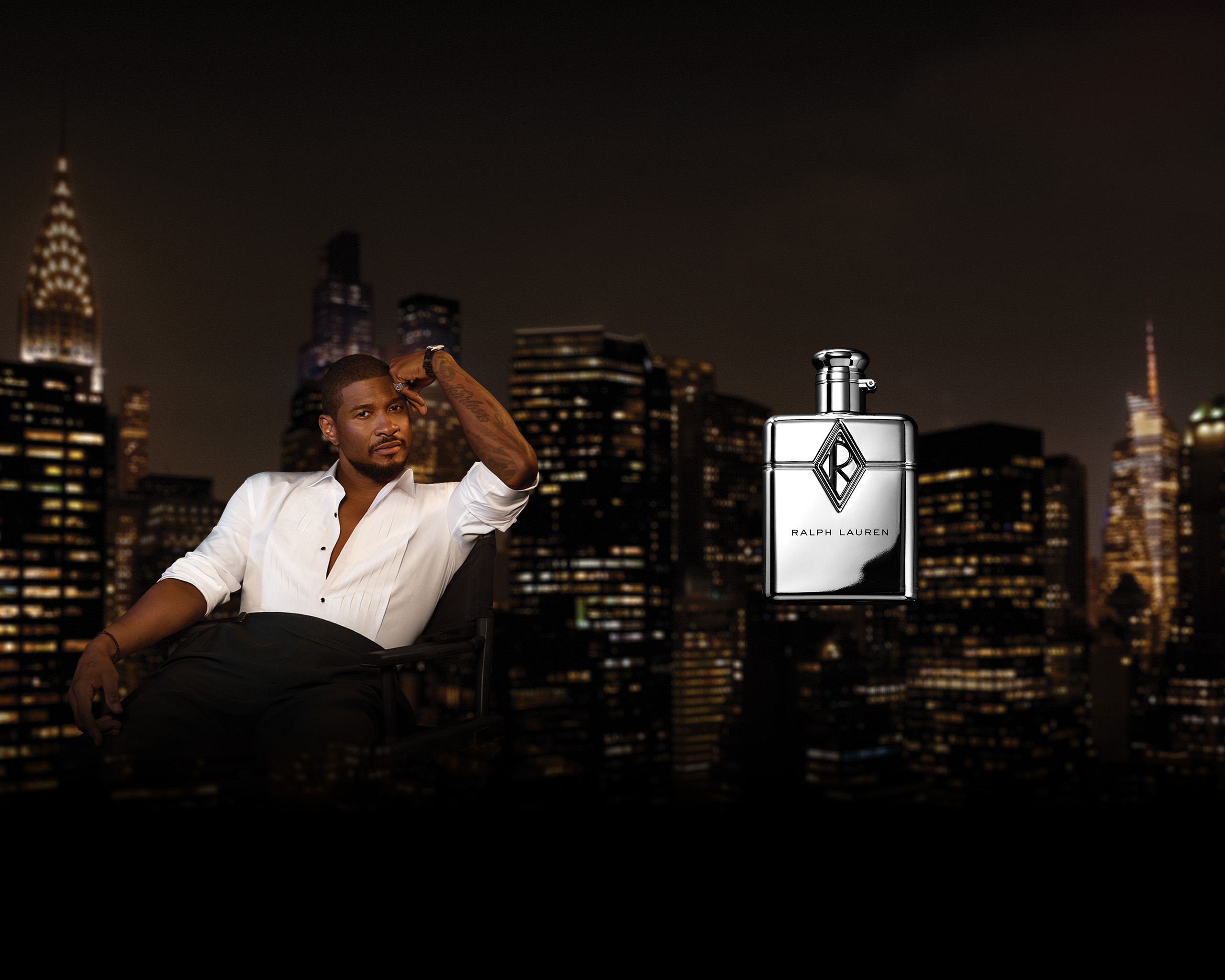The Palestinian writer—in conversation with Hannah Black and photographed by Nan Goldin—speaks on his new book 'Perfect Victims,' an unflinching indictment of Zionism and the spectacle of respectability
Through the interruptions of a patchy internet connection, Palestinian writer and organizer Mohammed El-Kurd and I discuss the massive, murderous pressure on language—a pressure that Palestinians withstand every time they open their mouths. He is in a friend’s apartment in Manhattan. I see exhaustion written on his face. We talk about his friend in an Israeli prison. We talk about the emotional fragility of oppressors. We miss words as the video glitches.
At just 27, El-Kurd has already lived much of his life in the public eye, long before the release of his widely acclaimed new book. Perfect Victims is a polemic asserting the Palestinian right to self-defense. It’s also a repudiation of the media’s racist insistence that Palestinians must, above all else, consider the feelings of those carrying out their annihilation. With humor and sharp analysis, El-Kurd’s writing refuses this surreal demand.
He is intimately familiar with the discursive sadism of Zionism. He has also experienced its material effects. In 2009, when El-Kurd was just 11 years old, settlers squatted in part of his family’s East Jerusalem home. The shocking situation attracted international attention, propelling El-Kurd and his twin sister Muna into the limelight. In 2021, a video of Muna confronting one such settler went viral. “Jacob, this is not your house. You are stealing my house,” Muna explains to the American settler. “If I don’t steal [your house], someone else is gonna steal it,” Jacob responds. Then, as now, global outrage was helpless to alleviate Palestinian suffering.
In 2022, the struggle for the El-Kurds’ neighborhood, Sheikh Jarrah, became the catalyst for the Unity Intifada—a historic and peaceful alliance among the fragmented parts of all of Palestine. In response to unarmed civilians demanding basic rights, Israel bombed Gaza. But that time around, the bombing stopped after two weeks.
Three years later, and 77 years since the Nakba began, the atrocities of occupation have intensified into open genocide. The facts of the situation are intolerable: an entire population trapped, starving, mutilated, massacred, under the lethal rain of drones and bombs. Estimated death counts reach into the hundreds of thousands. Each day brings new horrors.
El-Kurd continues to navigate the painful contradictions of his enforced role of spokesperson. He does so because his work is vital. The spontaneous, global upwelling of solidarity with Palestine is met with institutional censorship, media doublespeak, and open repression. The gap between representation and reality widens. But popular sentiment has some heliotropism toward truth, and the humor, grace, and sanity of El-Kurd’s writing helps anchor us in reality. Palestine is a fact and a promise. “The world,” he writes, “is changing because it must.”
Hannah Black: How does it feel being in New York at the moment?
Mohammed el-Kurd: It feels strange to be around so much serenity despite the chaos we’re dealing with. You’re seeing so much devastation, not only around the world and in Palestine, where I’m from, but also here. There are 40,000 people in ICE custody today. There continues to be so much homelessness in this city.
And yet, people live their lives as if nothing’s going on. People have been trained to think of catastrophe as this all-encompassing event. But in fact, throughout history, atrocities have been committed against the background of people going to their office jobs and whatever.
Hannah: I’ve noticed, especially in poetry, but elsewhere as well, an existential question coming up around how to go on with everyday life while genocide is happening. “A genocide is happening and I’m eating breakfast”—that kind of thing. In some moods, it strikes me as fundamentally trivial or even kind of narcissistic. But then in other moments, I think, well, it might be an important question. Do you have any thoughts on that?
Mohammed: It’s good to talk to your friends about these things, but I think these are conversations you keep to the group chat. I don’t think this is for the stage or for the page. I think our role is to shift the lens from how we feel about what’s happening to what’s happening.
Hannah: Your book Perfect Victims is partly about your own experience, when very young, as a child spokesperson against the Zionist occupation. This was in a context where Palestinian children were forcibly cast as these relatively depoliticized, safe subjects compared to their parents. Today, as an adult, you have a far more uncompromising analysis. Do you think that this shift in your own life mirrors the recent history of Palestine, from the false hope of the Oslo Accords up to the unmasked brutality of Zionism today?
Mohammed: Yeah, I absolutely think my own political journey is linked with the historical changes. I was born four years after the Oslo agreement. When I was eight or nine years old and talking to international journalists, I believed that the international community would behave in accordance with justice. As a child, I believed in the human rights framework. Today, it’s very obvious that human rights only apply to select individuals. We have to have a different approach.
The Unity uprising in 2021, where people from all over Palestine came together, and October 7 and the genocide waged on the Gaza Strip—these events brought a level of radicalization that the Israelis did not expect. They went into Gaza in 2023 with absolute brute force, thinking that they would destroy Palestinian resistance. And it did the absolute contrary. It damaged their reputation worldwide and, more importantly, it imbued people with anti-colonial sentiment, because now they can see clearly what Zionism really is.
“Our role is to shift the lens from how we feel about what’s happening to what’s actually happening.”
Hannah: The scholar Robin D.G. Kelley made a comparison between your book Perfect Victims and Aimé Césaire’s Discourse on Colonialism. Césaire and his Caribbean contemporaries were also forced to unlearn a certain level of belief in the lies of colonialism. They went as young people to the colonial center expecting to be welcomed and to get an education, and what they found there was white supremacy and profound racism. It reminds me of what you say about your childhood faith in the rights-based international liberal order that was later revealed as hollow. I feel like this relates to a general unlearning and disillusionment that many of us are, to some degree, having to go through right now. This mass clarity is a painful but real gift.
Mohammed: I was really happy to see Robin compared my book to Discourse on Colonialism, because I really respect his opinion. I think that the similarity is in what my book attempts to do, which is to talk about the power dynamics of colonialism.
As a Palestinian, you are often expected to take on the role of a historian, memorizing United Nations resolutions. Most of the time, rather than being interviewed in good faith, Palestinians are put on trial, and they have to defend themselves against the racism of the Western world and, increasingly, the Arab world as well. The victims of colonialism are accused and condemned as if we are to blame for our oppression. It’s insane to scrutinize the victim and let the perpetrator off the hook. The root cause of everything is colonialism, and it’s what needs to be addressed.
But it’s important to not constantly cater to a racist audience. We will be maligned no matter what, and it’s important to talk to each other, because that’s the only way we can actually engage in critical debate and find a way to create progress.
Hannah: Do you think it’s too optimistic to read some of the repression against Palestinians and Palestine solidarity as a reflection of the fact that the genie is out of the bottle, and there is no longer any moral argument for Zionism? There is an incredible level of popular support for Palestine, especially given the vast resources that are being poured into the Zionist propaganda effort.
Mohammed: I think that is precisely the reason why there is so much repression. The root cause of the repression is the mass awakening and politicization against Zionism. Students who are being abducted from their university campuses are facing an infringement of free speech, and we should talk about that, but fundamentally it’s about Palestine.
It’s not as if the Zionists are exactly grasping at straws—the United States, the UK, Germany, these are all extremely powerful states—but certainly they recognize that they are so blatantly wrong that everybody sees through it. The kinds of things that are happening are so absurd and so brutal that not even the most sophisticated, distorted New York Times headline can disguise it.
Hannah: Perfect Victims inhabits a contradictory space, critiquing the politics of appeal while, on some level, still enacting it. You’re very aware of this contradiction, and even write about it in the book. You also alluded just now to a similar contradiction where, even as we see a certain liberal, legalistic order appearing to collapse before our eyes, we still have to appeal to some of its categories, for example freedom of speech.
Mohammed: I think we should be fighting on all fronts. There is the side of the West that defangs the Palestinian and only accepts the Palestinian who is a victim and vilifies the Palestinian if he or she decides to engage in resistance. But there’s also another side of this equation, which is the people in the West who romanticize the resistance as if they are invincible heroes. I think what that does is that it absolves us of our ability, of our responsibility to work and to struggle in the ways we have available to us here in the United States.
Without the US, there wouldn’t be an occupation. We need all of these parts, the resistance and the media advocacy and the student movement, they’re all part of an ecosystem. Without media work, the resistance would be seen only through this hegemonic lens that vilifies it.
It was arguably the genocide that lost the Democrats the election, and we know the Democrats don’t learn much, but hopefully that will be a lesson that Palestine is not a marginal issue, it’s central.
Hannah: Well, they hate winning elections. In recent years we’ve gotten used to a discursive mode of radicalism, that’s had a lot of internal contradictions, but has also opened up a lot of space for political education. I wonder if you have a take on where that’s at. I just was reading today about how many philanthropic foundations have punitively withdrawn funding from abolitionist organizations and even abortion funds, just because the organizers made a statement against the Zionist genocide.
This is philanthropy that happened supposedly because of white moral conscience awoken by the George Floyd uprising. But they dropped their support for poor black communities as soon as they showed solidarity with Palestine. That’s just one indication of what feels like a kind of paradigm shift. It feels like we’re potentially in a new moment, where the contradictions of the woke era are becoming massive fissures in the whole structure of the culture industry.
Mohammed: I’m of the opinion that we should be as loud as we can now, even more so than before, because the way fascism works is that once they take over some of the ground, we will never be able to retrieve it. They’re doing these really high-profile cases of intimidation, like the White House tweeting directly at students. They cannot round up all of the students, but the motive of this project is to scare and intimidate students.
So, my biggest worry is that people are pre-emptively doing everything they can to hide behind the scenes, out of fear. I don’t want to call it cowardly, because so many people have true losses to consider. But there are a select few who have the means to be louder, who have the protection and the visibility to be bolder, and I am afraid that this is waning.
Hannah: The George Floyd uprising in 2020 galvanized liberal sympathy, so I guess one task is to keep the ground that’s already been claimed. It’s clear that what happened on October 7 was an act of resistance to lethal, systemic oppression, just as was the burning of the police precinct in Minneapolis. Anyone not deluded by supremacist thinking can see this.
On the other hand, there are people who are broadly pro Palestine who are coming from more of a non-profit or careerist space, and they are willing to both-sides it at least a little bit, and we all understand why.
Mohammed: Many people can only support resistance when it’s in the past tense. I think what’s happening here is that for decades, Zionism has been an American value and a British value. What’s now happening in the streets, at people’s dinner tables, on student campuses, is that anti-Zionism is becoming the value, on a mass scale. We are seeing so many people adopt an anti-Zionist politics.
As a result, we’re seeing institutions like Columbia University go above and beyond, to an almost bizarre degree, to maintain the idea of Zionism as a redeemable value. Throughout history, Zionism has shifted its meanings multiple times. It has mutated. At first it was openly, aggressively colonial, and later its supporters tried to redeem it into this kind of anti-colonial movement, despite its extremely colonial nature.
Some of those targeting anti-Zionist students and academics and professionals are spineless, and others still believe in the ethno-supremacist project of Israel. We’re constantly being told that we cannot resist this genocide, we can’t even oppose this genocide, because it might enable a different hypothetical genocide against the people perpetrating it. That is supremacy. That’s really problematic.
I think if the past 18 months have not taught us that Zionism is irredeemable, then we cannot learn anything.
Hannah: Palestinians are put in a completely impossible situation. If a Palestinian says, essentially, I love my people and I don’t want to die, that is considered hate speech. It’s part of the distortions of language that are brought to bear on Palestinian speech. Everything from having to produce an encyclopedia of facts to justify not wanting to be displaced from your home, to this kind of absurdist situation where the desire not to be massacred and made homeless is considered antisemitism.
Going back to Césaire, it makes me think of his turn to surrealism, as a kind of escape from the trap of colonial language. At the end of your book, you talk about humor as an escape from some of the impasses of language that you find yourself in as a Palestinian.
Mohammed: The accusations are meant to restructure the conversation from a debate about the brutality of colonialism to a debate about how the subjects of colonial violence should behave. The answer to that isn’t always logic or education. The answer is oftentimes irreverence.
When you’re in a TV interview and the anchor accuses you of something, and you defend yourself, what you’re doing is reapplying the anchor’s authority over you. It’s much more powerful to ridicule, to step out of the question and turn it on its head, to question the authority of the person asking it, to reveal the ulterior motive.
That is not only dignifying to you and protective of your psyche, it’s also a pedagogical tool. People who are watching or hearing you speak are influenced by your words, by the way you challenge the power dynamic. This irreverence is the only way we can shatter those taboos, the false accusations of antisemitism, the tropes of the Palestinians hiding behind human shields, and so on. The only way to challenge them is to reject them outright, not to defend yourself against them.
“The answer to that isn’t always logic or education. The answer is oftentimes irreverence.”
Hannah: There is a scary absurdity to Zionist propaganda. You discuss this in the book: the copy of Mein Kampf that magically appears in a Palestinian classroom, just like the gun that cops conveniently find on the police brutality victim. Zionist arguments make no sense. “You have to support Israel because it’s the only Jewish state,” as if everyone else also lives in an ethno-supremacist apartheid state and the Jews are being unfairly excluded.
Mohammed: The Zionist narrative around the Holocaust is important to discuss. We’re told that the possibility of a second Holocaust against Jews is way more important than attending to the actual genocide of Palestinians taking place right now. But it’s completely untrue that anti-colonial resistance resembles Nazism—in fact, it’s colonialism and fascism that are linked. Césaire says that Nazi brutality in Europe was first made possible by colonial brutality in Africa, the Middle East, and elsewhere.
The Holocaust was one of the most terrible atrocities in history, but just like there is resistance today in Gaza, there was resistance to Nazism. People fought, they took to the streets, they rioted—but this is obfuscated from history. Instead, there’s a celebration of victimhood, which leads to a climate of paranoia.
Israelis have nuclear power. They are an ethno-state. They have the backing of the world’s most powerful superpower, the United States. And yet they still feel that they are in peril.
“If the past 18 months have not taught us that Zionism is irredeemable, then we cannot learn anything.”
Hannah: It was often communists who resisted Nazism. It’s difficult for the West to talk about the actuality of resistance to Nazism because then they would have to say something positive about communism.
In your book, you express some ambivalence about being a spokesperson. I wondered how that relates to the question of leadership, and what we can learn from the Palestinian resistance about leadership.
Mohammed: It’s an interesting question. So many of us who are activists were plunged into this space because of something we had to endure, like our siblings being martyred, or so on. We are the ones speaking because our official representation, the Palestinian Authority, is not only incompetent, but it’s in cahoots with the occupation, it’s a subcontractor of the Zionist regime.
And because resistance is vilified, you never hear or see any major network quoting Hamas officials unless they say something that can be easily taken out of context and used against them. There’s no even-handed reporting of what the Israeli and Palestinian leaders say. And thus the role of advocacy falls on the shoulders of the bereaved and the victimized.
I don’t know if I can answer the question about leadership, but it’s really important to think about what is our political project in the long term, because so much of what we are forced to do because of our circumstances is reactive. We’re constantly being killed. Our students are constantly abducted. Our friends are being disappeared. And we’re constantly reacting, reacting to our house being demolished, reacting to the killing of medics and journalists, and so on. There needs to be some space to tend to the political project as well.
Hannah: There was a piece by Abdaljawad Omar in Mondoweiss where he talked about how, because of Israeli repression of Palestinian political movements, we have ended up with a situation where you have the collaborationist Palestinian Authority on one hand, and the armed resistance led by Hamas and other groups on the other, and nothing in the middle. Do you see your work as potentially being part of recreating and supporting that middle ground?
Mohammed: The grassroots has historically played an important role after every crackdown or revolution. But people burn out and lose faith. This is where the importance of building organizations lies. It’s impossible to fully burden civil society with the task of liberation. We are going up against a superpower.
Last year, the Israelis increased their propaganda budget to three or four times the previous amount. Despite the fact that we are under-resourced and erased and censored, we have been able to shift public opinion to a large degree. But there remains the question of how to make the movement for Palestine more sustainable.
I worry sometimes that this mobilization is predicated on corpses, on the sight of dead children. I hope the bombing stops, of course. I cannot wait for the day the bombing stops. I pray for it every day. But we need to be able to build and create a politics that means even when the bombing stops, people are still on the streets, still talking about anti-Zionism as a national and cultural value.
Hannah: Street mobilizations have a natural tempo where they flare up and then go away again. People use that to criticize the George Floyd uprisings. They say, well, it didn’t produce any kind of long-lasting political structures. But many of the students participating in the Palestine encampments say that they’re there because of what they learned during the uprising in 2020.
It also comes across clearly in your book that young Palestinians were also watching the George Floyd uprising and there was a lot of reciprocal learning happening. There was the solidarity moment back in 2014, during the Michael Brown uprising, where Palestinians were telling the rioters in Ferguson how to deal with tear gas. Moments of struggle might seem to disappear, but they reappear when needed.
Mohammed: I remind myself that optimism also is an obligation. If we’re assessing the ground we’ve gained on the basis of how we feel, then we’ll feel as though we failed. But I think it’s important to look at the bigger picture and see how many people have been changed forever, and their politics will not suddenly fizzle out.
Hannah: Just one last thing. The book has so many images of animals. You mention chimpanzees and dolphins. You even clarify that wolves don’t really howl at the moon.
Mohammed: I am quite obsessed with animals and learning about animals. I’ve always wanted to write a poetry book that’s like a bestiary where animals play different roles. This book was really incredibly hard to write. So, to entertain myself in the process of writing, I incorporated these things. It was also kind of a rebellion against the traditional form of writing about Palestine, the very solemn tone. I would love to write about animals. It’s like the Marwan Makhoul poem:
In order for me to write poetry that isn’t political,
I must listen to the birds
and in order to hear the birds
the warplanes must be silent
Production Adnan Qiblawi. Production Assistant Anabel Gullo. Special thanks to Nan Goldin Studio.

